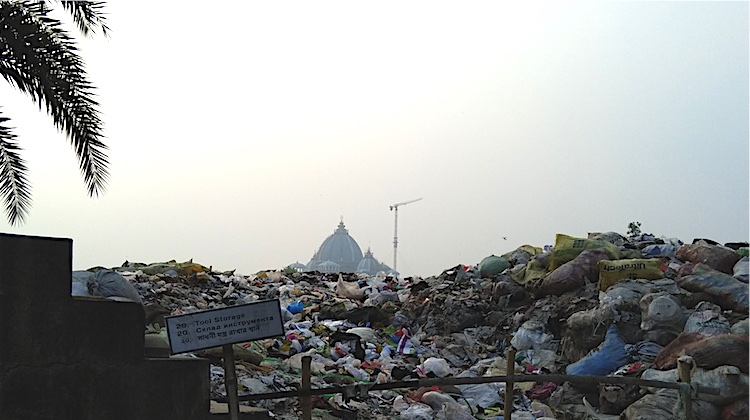Zero Waste Mayapur
By Lalitamrita Dasi | Mar 30, 2018

Anybody coming to India from Western countries is shocked to find out that here it is common for people to throw garbage just anywhere on the streets. In Vedic times, and in the not so distant past, all of the waste was recycled, which was not so difficult to organize as only organic items were used in household activities. Therefore, in India somehow the habit remained that people do not bother much with cleaning the piles of junk lying around. However, today, because the junk is now consists mostly of plastic bottles and bags, it just never seems to dissolve into the earth again. Thus this is a big problem that streets and roads are covered with garbage that doesn’t decay.
The managers of the spiritual city of Mayapur are therefore doing their best to keep the ISKCON premises clean from garbage waste. Big blue containers are available everywhere for pilgrims to dispose their garbage. But what happens with this waste when the bins are emptied? Instead of putting it all in one big pile the managers have come up with a recycling program called „Zero waste Mayapur“.

Streets and roads in India are covered with garbage that doesn’t decay.
Hari Lila Das a Mayapur community leader in charge of the Green and Clean Department explains that „previously garbage from our campus and the surrounding area would go mainly into the land fill. With the establishment of the Eco Centre near Taranpur Ghat, now all the waste is sorted and recycled. Household waste in Mayapur is collected and sorted by teams of locals using several container-bicycles and one tractor.”
Then the garbage is separated into organic and non-organic waste, transported without pressing and sorted by hand. The non-organic waste is further separated into raw materials that can be recycled and sold. Toxic waste (batteries, lamps, medicine) is sent to other companies.
The garbage in Mayapur is 65% organic and most of it can be made into compost. Organic waste is matter that can decompose (like food, flowers, leaves, straw and cow-dung), creating nutrient-rich compost, which can be added to the soil instead of using chemical fertilizers.
Hari Lila Bas further explains that “the organic waste is made into compost by tipping it into mounds, long hills, which are kept moist and fed with bacteria. Two kinds of bacteria are grown in a water mix in a cool, dark cellar. It takes about one year for the organic matter in the mounds to transform into compost. This natural process can be speeded up with aeration (adding air), and by turning the compost. Recently we bought an aeration machine which hooks up to a tractor. The aeration machine is used for turning the compost in the mound. If aerated, the compost can be ready in just 20-30 days.”
Finally, the compost is sifted to take out any remaining non-organic materials, then bagged and sold to farmers and other users. Bio-compost stimulates plant growth and can even double the yield, makes the plant more disease-resistant and reduces irrigation costs by holding onto water.
Residents of Mayapur are advised to carry cloth bags for shopping, and say no to plastic in any form (bottles, furniture and kitchenware).
* * *
Anybody wishing to contribute to the Zero Waste Mayapur program, or join the research or promotional team please contact: zwm108@gmail.com“















